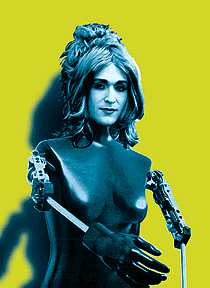|
press プレス |

|
"Neu Wuss Fusion" Subtitle - Text by David Pescovitz, Images by Terre Thaemlitz |
In Artbyte, April/May 1999, Vol. 2, No. 1
A haunting expressionist cascade of acoustic piano fills New York City's performance space the Kitchen. Slowly, a vaguely familiar melody emerges. It's "The Robots," by Kraftwerk. The audience's gaze, distracted by slide projections of mutated, sexually charged Kraftwerk imagery, returns to center stage. There, in front of a grand piano with a glowing computer atop it, sits a statuesque drag queen, male features too prevalent for him to pass as a woman but made up meticulously enough to signify a practiced transvestite.
After a few minutes of grand tinkling of the ivories, the performer suddenly raises his/her hands from the piano in a panic and begins typing furiously on the plastic keyboard of a Macintosh. However, the music continues, leading the concertgoers to quickly determine that the seemingly bumbling performer was attempting to dupe them with a digital recording and some painfully bad lip, or rather hand, syncing. What a mistake, one audience member murmurs. Actually, it's Miss Take--the name of the drag queen on the stage, a persona of Oakland-based computer musician Terre Thaemlitz. And the empathetic embarrassment and confusion felt by the audience at this anti-spectacle is exactly her point.
Thaemlitz is a transgender/transgenre computer musician. A pomo-sexual producer wading through Marxist theory while a soundtrack of Styx, Stevie Wonder, and Japanese techno-pop plays in the background at home. A creator of cultural commentary in the form of computer-generated hard-listening anti-Muzak.
"The overall theme of my work has to do with the fragmentation of identity, and the way that dominant ideologies teach us to conceptualize the singular self, the individual, when really we're forced to play many different roles every day," says Thaemlitz, cruising through his run-down Bay Area neighborhood in a jacked-up Buick Skylark. "I play a musician. I play the anti-musician. I play a fag. I play a drag queen. I play an ex-husband. A business administrator. Queer. Straight. Gay. But we don't really have a popular ideology that directly embraces such fragmentation."
Indeed, he writes in the liner notes to Die Roboter Rubato (Mille Plateaux, 1997), the album on which he based the Kitchen performance, "Emerging from the actions of this reconstructed body I contemplate discourses which speak of specificity rather than universalism. Sound as discourse which actively discloses a concept of referentiality and contents that intermingle with my intentions as a producer. Means of production that treat methodologies as the endlessly recurring shadows of those signifiers undergoing deconstruction."
Even in queer communities which are viewed by outsiders (and many insiders) as removed from the effects of cultural mainstreaming, Thaemlitz finds hypocrisy and homogenization. His latest release, Love For Sale - Taking Stock In Our Pride (Mille Plateaux, 1999) critiques the commodification of lesbian and gay culture and its reconciliation with middle-class ideals, from corporate-sponsored pride parades to media-friendly issues of domestic partnership.

"The objectives of queer diversity are marginalized by a lesbian and gay mainstream which attempts to put the politics of sexuality back in the closet," Thaemlitz says. "Representations of lesbians and gays as a powerful financial force disguise the reality of economic and cultural disempowerment."
That anti-commercial, fragmented freak philosophy has been the core of Thaemlitz's talk since he was an art student in the mid-1980s and began moonlighting as DJ Sprinkles at ACT-UP/NY benefits and Times Square sex-worker clubs. His first full-length release, 1994's Tranquilizer (Instinct Ambient), was a groundbreaking ambient composition, a quiet storm of electro-acoustic music. Still, Thaemlitz never attended a rave, where in the chill-out rooms his early music was perhaps most heard.
"I was always put off by the pretentious 'melting-pot' plurality of the rave scene," says Thaemlitz, now sitting in his studio, which is decorated with a yellow shag rug and staunch minimalist paintings. "The result of 'we're all one' spiritual humanism is ultimately homogenization rather than diversity. In the final analysis, it's over-the-top straight and bourgeois in its aspirations."
While anti-humanist philosophies combined with a sharp pen kept him purposely alienated from the cyber-spiritual community, Thaemlitz quickly found himself with new, and equally problematic, musical associations--minimalism, avant-garde computer music, experimental 20th-century composition, and academia. It's true that his subsequent releases--Soil (Instinct Ambient, 1995), Couture Cosmetique (Caipirinha Productions/Daisyworld Discs, 1997), Means From an End (Mille Plateaux, 1998)--contained more distorted, processed electro-acoustic music along the lines of the 20th-century electronic avant-garde, but there remains an ideological chasm between Thaemlitz and producers such as Microstoria, much of the Touch record label roster, or the New York City Illbient enclaves he is often lumped with.
Today's avant-garde turntablists and producers, he explains, tend to adhere to John Cage's "sound is sound" mantra in their attempts at decontextualizing audio samples through cut-and-paste mixes. But for Thaemlitz, content is forever conditioned by context. For example, a snip from Billy Joel's "I Love You Just the Way You Are" on Means From an End was chosen both for its nostalgic evocations and its "lack of appeal as an 'anti-Feminist' anthem against concepts of change." Or the somber string sample borrowed from a classic gay disco cut for Soil's "Yer Ass Is Grass," a track focusing on violence and paranoia in dominant culture.
"A sample is like a footnote," Thaemlitz says. "I consider it a way to make references, establish context, and respond to other producers. Unfortunately, the music industry makes it illegal to do so. The contexts I put these sounds in never satisfy the industry's strict approval processes."

Over the past year, Thaemlitz has been carefully fragmenting his catalogue as well, releasing music through his own label Comatonse Recordings in a broad range of genres that do not necessarily mix with his electroacoustic endeavors. For example, Terre's Neu Wuss Fusion melds 1970s jazz-funk with electro-acoustic elements and heavy improvisation, while G.R.R.L. features eleven tracks, each one performed in an incongruous style of techno. His latest Mille Plateaux release, Institutional Collaborative, with Dartmouth University-based computer musician and writer Jane Dowe, uses computer composition to explore both producers' simultaneous involvement in the realms of the music marketplace, academia, and the popular music press.
"It's easy for critical discourses to confuse and piss some people off, but when you're already dealing with specialized music markets it's even more confusing for producers and listeners to define ourselves through the terminology of the rock star," says Thaemlitz, booting up his computer and clunking a hardhat over his wig.
It's deconstruction time again.
Terre Thaemlitz on the Web: www.comatonse.com
David Pescovitz (david@pesco.net) is the co-author of Reality Check
(HardWired, 1996) and a contributing editor for Wired, I.D. Magazine, and
bOING bOING. His writing on technology, art, and culture also has appeared
in the New York Times, Los Angeles Times, MTV Online, and Discovery
Channel Online. He is the co-creator of www.tvultra.com, a daily pointer
to the most interesting show on TV.